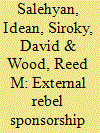|
|
|
Sort Order |
|
|
|
Items / Page
|
|
|
|
|
|
|
| Srl | Item |
| 1 |
ID:
145030


|
|
|
|
|
| Summary/Abstract |
Why are some countries prone to ethno-nationalist conflict, whereas others are plagued by class conflict? This is a question that has seldom been raised and rarely been examined empirically. This paper presents a social-structural theory to account for the variable incidence of these two forms of political instability. These two types of conflict result from distinct principles of group solidarity – ethnicity and class – and since each individual is simultaneously a member of an ethnic group (or many such groups) and a particular class, these two principles vary in the degree to which they are mutually exclusive or cross-cutting. The degree of economic stratification between groups and economic segmentation within them shapes the relative salience of each principle of group solidarity in any society and is associated with a characteristic form of political mobilization. In places where between-group inequalities are high, and within-group inequalities low, ethnicity should be the dominant principle of group solidarity and serve as the primary basis of group conflict. By contrast, in countries where between-group inequalities are low, and within-group inequalities high, class is more likely to serve as the dominant principle of group solidarity, and conflicts along class lines are more likely. We test these conjectures with data in over 100 countries on cross-cutting cleavages, ethnic war, and class conflict. The results are supportive of the theory, and provide evidence that how groups are stratified and segmented in societies shapes the type of civil war.
|
|
|
|
|
|
|
|
|
|
|
|
|
|
|
|
| 2 |
ID:
133276


|
|
|
|
|
| Publication |
2014.
|
| Summary/Abstract |
Although some rebel groups work hard to foster collaborative ties with civilians, others engage in egregious abuses and war crimes. We argue that foreign state funding for rebel organizations greatly reduces incentives to "win the hearts and minds" of civilians because it diminishes the need to collect resources from the population. However, unlike other lucrative resources, foreign funding of rebel groups must be understood in principal-agent terms. Some external principals-namely, democracies and states with strong human rights lobbies-are more concerned with atrocities in the conflict zone than others. Multiple state principals also lead to abuse because no single state can effectively restrain the organization. We test these conjectures with new data on foreign support for rebel groups and data on one-sided violence against civilians. Most notably, we find strong evidence that principal characteristics help influence agent actions.
|
|
|
|
|
|
|
|
|
|
|
|
|
|
|
|
| 3 |
ID:
120173


|
|
|
|
|
| Publication |
2013.
|
| Summary/Abstract |
What explains change and continuity in the foreign policy behavior of small states? Given the proliferation of small states over the past century, this topic has received relatively little systematic attention. When researchers do focus on small states, the emphasis has been on external and international factors, and the primary conclusion has been that small states are more likely to bandwagon with threatening great powers than to balance against them. In this article, we suggest that state- and individual-level variables can play a greater role in explaining the foreign policy behavior of small states and that small states sometimes choose to balance rather than bandwagon, especially when elite ideology is deeply embedded in formulating foreign policy. We develop this claim in terms of elite ideas about the identity and purpose of the state and examine its plausibility using primary sources and exclusive interviews with the security and foreign policy elite in Georgia. We find that this approach offers a more plausible explanation for Georgia's otherwise puzzling foreign policy behavior than frameworks that focus on the international or regional system. Although Georgia may be the exception that proves the rule, it can advance an understanding of the conditions under which standard explanations of small-state foreign policy behavior may miss their predictive mark and when incorporating the role of elite ideas can provide additional explanatory leverage.
|
|
|
|
|
|
|
|
|
|
|
|
|
|
|
|
|
|
|
|
|